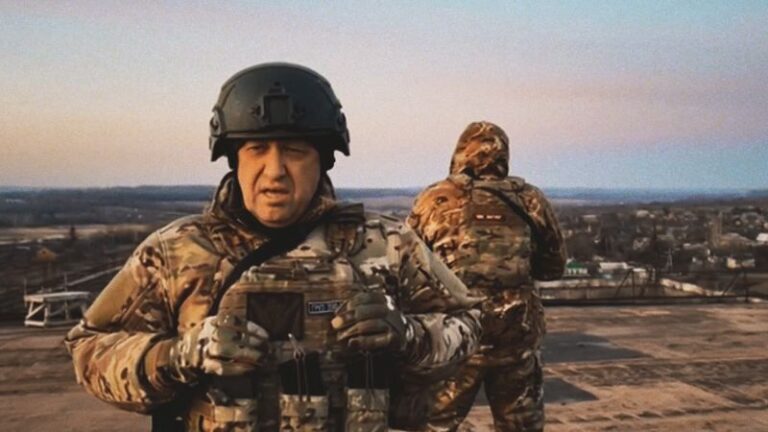Zaporizhzhia, Ukraine
CNN
—
“These are someone’s f**king fathers and someone’s sons. And you f**kers who aren’t giving [us] ammunition, you b*tches, will have your guts eaten out in hell!” yelled Prigozhin in Thursday’s video.
In just the past 48 hours, the Kremlin made a stark admission its seat of power in the heart of Moscow, was attacked by what it claimed were Ukrainian drones in a bid to assassinate President Vladimir Putin.
And then this morning, perhaps the most prominent figure in Russia’s military, Yevgeny Prigozhin, the self-promoting head of the private military company Wagner, used his Telegram account to say he will withdraw his forces from Bakhmut on May 10.
There is not even an “unless” attached to the threat. He simply says it will happen, so they can “lick their wounds,” as they refuse to fight on senselessly without enough artillery shells to function. And it will happen just after the May 9 Victory Day pomp and celebration, as, he insists, Wagner are patriots.
It is unclear whether Prigozhin hopes to leverage more weapons supplies, power, or money from these statements. He has stood before in front of the corpses of the Russian mercenaries and convicts he has launched at the frontline – without proper training or equipment – and demanded more ammunition.
He has also apparently been stymied from emptying out Russia’s prisons for new recruits, by the Russian Ministry of Defense employing convicts directly. But he has never said he will likely cripple one of Russia’s most symbolic frontlines by just walking away.
Wagner forces may constitute about half Russia’s presence around a city that has minimal strategic importance, but has gained huge symbolic weight since Moscow declared it a key objective last year. Both sides sent thousands of men to die in the fight. Now, the key advocate of the operation says he will just walk away in five days.
It won’t be that easy. Wagner forces would have to walk out of a battlefield which is – on the surface – for the most part controlled by Putin’s Ministry of Defense. Russian deserters have been shot on the frontline, repeatedly, according to multiple reports.
Withdrawal is a dangerous and complex operation at the best of times, and so on Wednesday, Wagner cannot simply hand the Airbnb keys over to Russian troops, and drive to the airport. Ukrainian forces will be keen to exploit any chaos to target withdrawing Wagner troops, and also wary of becoming sucked into committing forces to retaking the city, at a time when their wider counteroffensive seems to be getting underway.
For weeks, it has seemed that Prigozhin’s long-running, public feud with the top brass in the Russian Ministry of Defense might have subsided. Yet that is – at least publicly – not the case. Kremlin spokesman Dmitry Peskov could only admit he had read about Prigozhin’s declaration in the media and would not comment on it.
The Putin administration does not like appearing weak. The bedrock of the President and his ministers’ hold on power is that they are the calm, controlled, ruthless masters of Russia’s geopolitical destiny – ensuring order in the storm. An attack on the Kremlin, and the declaration that a private mercenary group will walk out on a key frontline, are not a good look – whatever the truth behind each situation.
Putin is absorbing a lot of bad vibes at the moment to seem that much in control. It is unlikely that any fissures at the heart of the Kremlin would be made public before they were acted upon. But these odd traces of disunity, or appalling security failings, do not support the concept of a president still executing a calm plan. They are reacting, rolling, and stumbling forward as unhelpful events unfold.
On the other side, Ukraine is, it seems, pressing on with its plan. Its President, Volodymyr Zelensky, just completed a symbolic tour of allied European nations, including The Hague in the Netherlands, where he got to joke he wanted to see “the other Vladimir” answer to his indictment in that court.
Indications from its military are of slight progress in the East, and readiness in the South. And Ukraine’s much-improved air defenses have made repeated nights of drone attacks from Russia a far less ghastly event than would have been the case a few months ago.
It is dangerous to predict how these unprecedented events may unfold. It is an equally dangerous moment in the war too, now that a Russian president – for the most part rational and calm, despite his disastrous decision to invade Ukraine – is faced with a whirlwind of bad public news that rips the carpet out from under the facade of his control.


